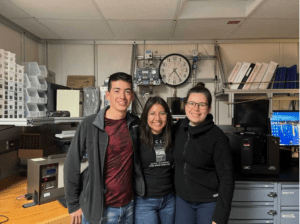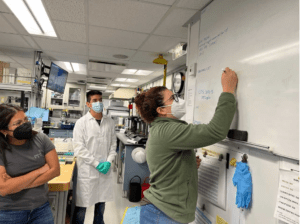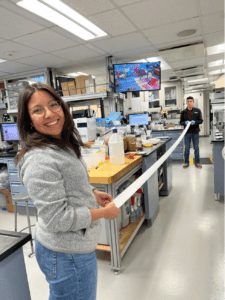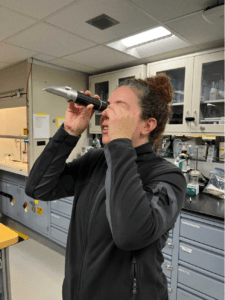
A letter on cultural congruity from Latino geochemists
The International Ocean Discovery Program (IODP) makes it possible to bring in diverse perspectives and experiences and foster international collaborations through its 21 country-members. As scientists, we get to develop working relationships with other scientists and technicians interested in marine-related research. Because of the diversity on board, it was possible for us diverse American scientists, who have been marginalized in American geoscience, academic, and societal spaces, to not feel defined or limited by our backgrounds. However, we weren’t expecting our night-shift geochemistry team to be solely Latino scientists. This unique experience inspired us to share on the safe, nurturing, collaborative, and fun environment that naturally formed among us.
Alex: Initially I was nervous to work in the geochemistry lab because I had never met my future coworkers. Typically, in new academic settings, I feel hyper-aware of my identities and take some time to find my voice in sharing ideas and comments. On board the JR, I realized I was also the youngest scientist and that contributed to my other feelings. However, when I first met Danielle and Oscar, I felt strangely calm and comfortable. It took me a while to realize it was because we had similar backgrounds, and once we started to share on this and related experiences, I realized we were more alike than we thought.
I’m very grateful to have had such an amazing team to work with during my first experience with IODP on-board the JR. I believe I learned so much in the lab because we had open and honest communication and we cared for each other’s learning. For Danielle, I hope to embrace the eagerness she had for sharing new ideas and her ability to share her expertise constructively. For Oscar, I hope to embrace the authenticity and confidence he brought when teaching and his ability to work hard while having fun. I will miss the impromptu karaoke, syringe air-mic to Beyonce, Taylor Swift, Los Angeles Azules, before heading into the chaos of sediment coring and squeezing. All the memories I have from this experience I will treasure and I can’t wait to hear about their future successes.
Danielle: Working the night shift with Alex and Oscar made my experience aboard the JR feel extra special. It was inspiring to watch two young Latino scientists thrive in a research environment all the while embracing their identities and bringing their authentic selves to the workspace. Although we come from geographically diverse backgrounds, our shared experiences became clear the more we talked about our childhood, family values, love of music, and life in academia. Personally, this was the first time I worked as part of an all-Latino lab crew and it reminded me of how important it is to feel like you belong. We accomplished such great science in the past two months and had so much fun doing it. I will always have fond memories of my time with Alex and Oscar and I cannot wait to see where life takes them. Wherever that is, I hope they continue to take up space, lead with confidence, and stay true to themselves.
Oscar: The first time I met Danielle and Alex, I felt a compatibility among us despite meeting for the first time. In part I believe this was because of cultural similarities but didn’t realize how rare this was. When we first started talking about our experiences in our academic lives, I felt my own experiences connect with theirs and realized that I wasn’t alone. Academic spaces can be isolating as a marginalized student and personally I tried to work extra, through taking on multiple research projects or other jobs, because of my work-ethic but also because of a subconscious requirement I felt in needing to stand out and compete. I also realized that students like us don’t receive necessary guidance in navigating higher education and we all had unique experiences in that faculty members that recognized us and decided to mentor us. I don’t believe I would have experienced this at a larger institution.
Because of these initial conversations and connections, we developed great communication and working relationships to complete our jobs in the chemistry labs. I felt we were all honest with each other and were able to speak out when we felt we had something to share or needed guidance. Additionally, we are all early-career scientists and there was additional layer of connection in acknowledging that we can all learn from each other and not feeling like I potentially wasn’t going to be heard when offering my expertise. I believe this experience between us was rare, and would be difficult to recreate in the geochemistry lab on the JR. We connected through our science interests, our experiences navigating higher education, and our backgrounds as low-income Latino’s pursuing success in oppressive scientific workspaces.
To capture the experiences I had with Alex and Danielle in a few short words is nearly impossible. It was always a fun time working with them in the fluid environment we created. I will reminiscence Danielle’s air-guitar solo, and Alex’s caring nature (she brought me snacks from the mess hall). Despite our slow days or fast days, whenever we were in the lab, it was comfortable. And I will be sad to see them both go.
*Cultural congruity is possible when behaviors and values reflect the setting/workplace perspectives. Predominantly White Institutions (PWI’s) typically reflect White male, middle-class perspectives. Lack of cultural congruity can lead to unwelcoming and/or hostile environments, isolation, and alienation.
**2/5th of geoscience programs fail to graduate more than one student from a marginalized group per year (bachelor’s degree)
**From 2010 to 2019, Black/African Americans, Hispanic/Latinx, and Native American/Alaska Natives receiving bachelor’s degrees increased from 9 to 16%, masters 7 to 10%, and doctorates 6 to 7% (Integrated Postsecondary Education Data System)
*From Cole and Espinoza 2008 “Examining the academic success of Latino students in science technology engineering and mathematics (STEM) majors”.
**From Beane et al. 2021 “Uneven increase in racial diversity of US geoscience undergraduates”.
Meet the authors
Alex Villa: A geology graduate student pursuing her PhD from the Department of Geoscience at the University of Wisconsin-Madison. Alex attained her B.S. in Geology from the University of California Los Angeles in 2018 and her M.S. in Geoscience from UW-Madison in 2020. Originally from southern California, Alex grew up in a predominantly Black and Latino, low-income community with her two sisters and immigrant mom. She discovered geology midway through her undergraduate studies where she took an introductory oceanography class and was inspired by her professor to pursue research. Since then, Alex has pursued paleoceanography and paleoclimatology research while advocating and leading discussions centering diversity, equity, and inclusion in the geosciences and higher education.
Danielle Santiago Ramos: Danielle is an assistant professor in the Department of Marine and Coastal Sciences at Rutgers University – New Brunswick. She is originally from Recife, Brazil, where she lived with her mom, stepfather, and younger brother until moving to the US in 2009. Danielle attended Amherst College on a full-ride scholarship and discovered the world of Earth Sciences in her sophomore year. After graduating with a B.A. in Geology in 2013, she completed her Ph.D. in 2019 (Princeton University, NJ) and a postdoc in 2022 (Woods Hole Oceanographic Institution, MA).
Oscar Cavazos: Research Associate- Chemistry Lab Specialist at the International Ocean Discovery Program. Graduated with a B.S. in Coastal Environmental Science in the spring of 2021 from Texas A&M University at Galveston. Oscar’s research interests started early in his undergraduate studies where he pursued several projects including reconstructing paleo-hydroclimates in the Northern Caribbean and communicating FEMA flood zone changes in the Houston-Galveston Metropolitan area. He would like to give a special thank you to Dr. van Hengstum, Dr. Dellapena, and Dr. Retchless for the opportunity to develop his research interests at Texas A&M University at Galveston.




What an amazing perspective to give to the work on Joides as a group of multi-cultural scientists and the experiences of 3 Latino Geochemists demonstrating anything is possible when combining passion, purpose, effort, and equity of opportunity.